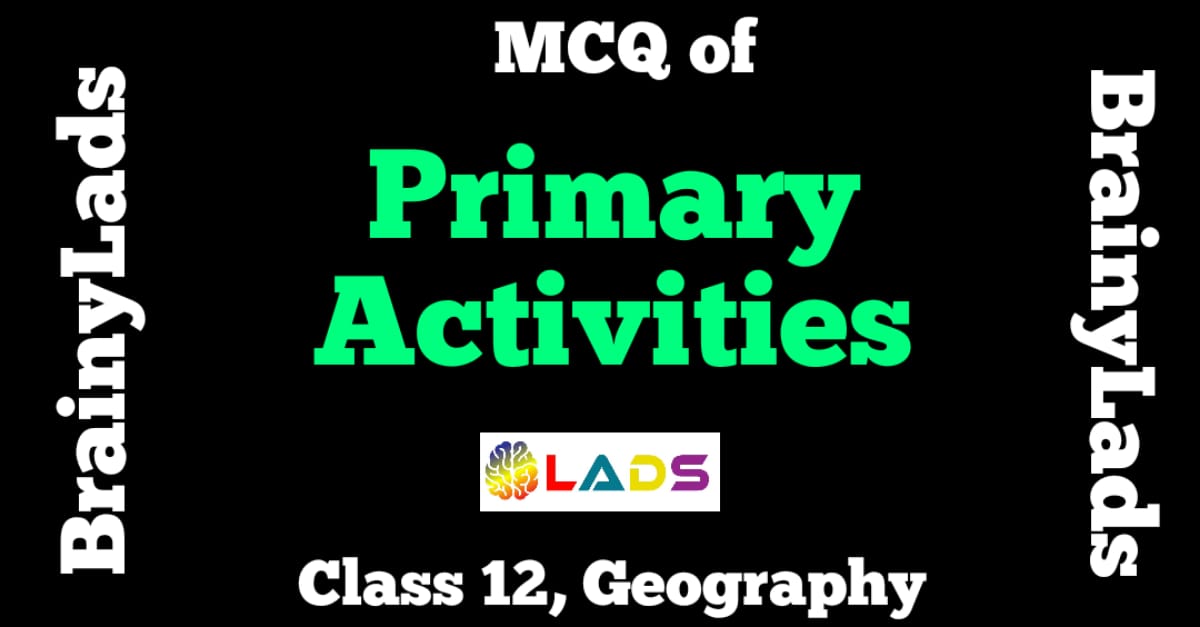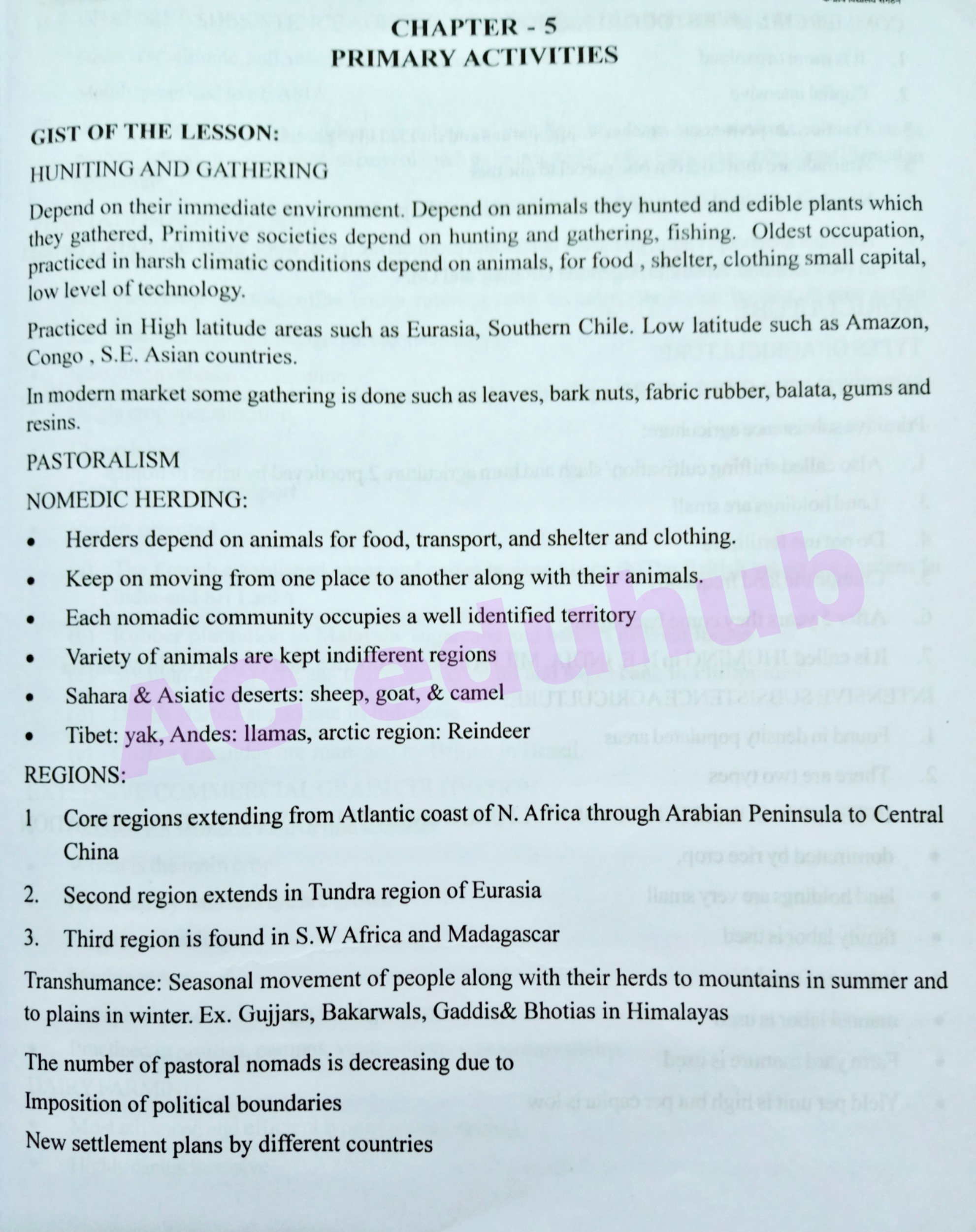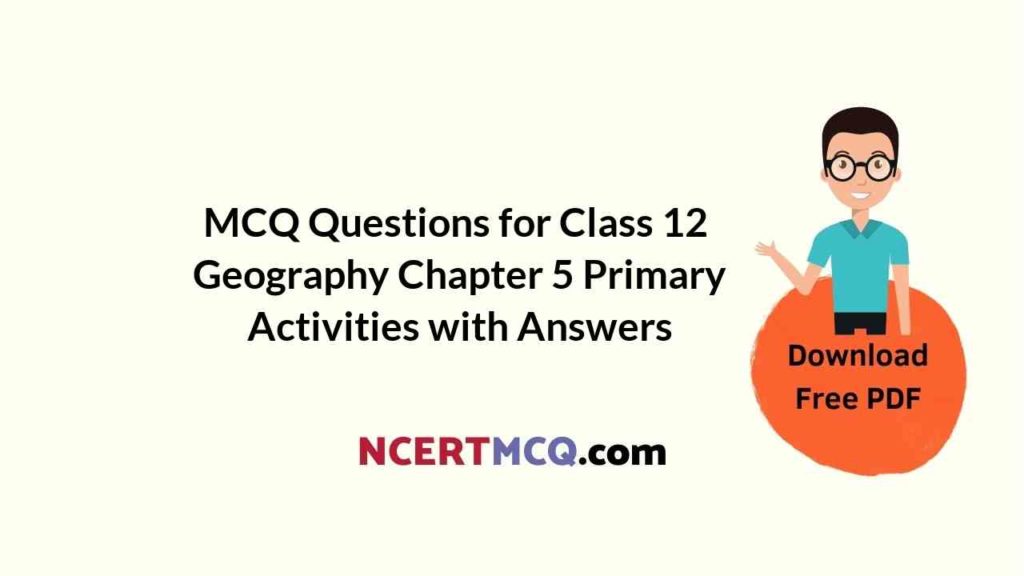
NCERT Book Class 12 Geography Chapter 6 Tertiary and Quaternary Activities (PDF)
#Class_12#Geography #Lucky_Education Book: Fundamentals of Human Geography : Important Questions Chapter Wise: Chapter 1 : Human Geography: Nature and Scope.

Chapter 5 Primary Activities Class 12 Geography NCERT YouTube
Q.1. The process of migration from plain areas to pastures on mountains during summers and again from mountain pastures to plain areas during winters is known as by what term? Ans. Trans humance. Q.2. In which agriculture single crop specialization is one of the features? Ans. Plantation agriculture. Q.3.

Primary Activities Class 12 One Shot Class 12 Geography Anushya Mam YouTube
It includes, hunting and gathering, pastoral activities, fishing, forestry, agriculture, and mining and quarrying. Hunting and Gathering • Gathering and hunting are the oldest economic activity known. • This type of activity requires a small amount of capital investment and operates at very low level of technology. • Gathering is practised in:

MCQ of Primary Activities Class 12 Geography Term 1 CBSE BrainyLads
The Primary Activities MCQ Class 12 Geography provided below covers all important topics given in this chapter. These MCQs will help you to properly prepare for exams. Question. Which one the following is not a plantation crop? a. Coffee b. Wheat c. Sugarcane d. Rubber Ans. Question.

𝐂𝐡𝐚𝐩𝐭𝐞𝐫 𝟓 𝐏𝐫𝐢𝐦𝐚𝐫𝐲 𝐀𝐜𝐭𝐢𝐯𝐢𝐭𝐢𝐞𝐬 𝐂𝐥𝐚𝐬𝐬 𝟏𝟐 𝐆𝐞𝐨𝐠𝐫𝐚𝐩𝐡𝐲 प्राथमिक क्रियाएँ 𝐍𝐂𝐄𝐑𝐓 𝐐𝐮𝐞𝐬𝐭𝐢𝐨𝐧𝐬 𝐑𝐨𝐡𝐢𝐭
Class 12 Geography NCERT Solutions Chapter 5 Primary Activities Class 12 Geography Chapter 5 NCERT Textbook Questions Solved 1. Choose the right answer from the four alternatives given below: Question 1. (i) Which one of the following is not a plantation crop? (a) Coffee (b) Sugarcane (c) Wheat (d) Rubber Answer: (c) Wheat Question 1. (ii)

NCERT Chapter5 Primary Activities Class 12 Geo Full Explanation in 20 Min Epaathshaala
10 Years Solved Papers -https://amzn.to/3D3eLeDNotes -https://t.me/TheTwinBros00:00 | Primary Activities Class 12 Geography Most Important Questions | Fasna.
5. Primary Activities B1Geography Class 12th Chapter5 NCERT CBSE NOTES IN ENGLISH
Chapter 5 Primary Activities is an important topic in Class 12, please refer to answers provided below to help you score better in exams. Learn the Chapter 5 Primary Activities questions and answers daily to get a higher score. Chapter 5 Primary Activities of your Geography textbook has a lot of questions at the end of chapter to test the.

Primary Activities class 12 Geography chapter 5 Part 2 YouTube
Chapter 5 Primary Activities NCERT Solutions for Class 12 Geography will help you in analyzing the problems and answering it with precision and the right concepts. Class 12 NCERT Solutions are useful in increasing concentration among students and checking your own answers.

Class 12 important Questions YouTube
1. Which of the following is correct about the economic activities? a. These are human activities which generate income b. They are broadly grouped in to primary, secondary, tertiary and quaternary activities c. Both (a) and (b) are correct d. Only (a) is correct Ans. Both (a) and (b) are correct. 2.

Introduction Primary Activities Class 12 Geography Chapter 5 NCERT & Dr Khullur notes
on November 1, 2022, 4:48 AM NCERT Solutions for Class 12 Geography Chapter 5 Important Questions of Primary Activities designed and updated for CBSE session 2023-24. Class 12 Geography chapter 5 Fundamentals of Human Geography extra question answers are confined to NCERT books only. Class 12 Geography Chapter 5 Important Questions

Primary activities class 12 notes geography YouTube
Primary Activities Class 12 MCQs Questions with Answers Question 1. Which one of the following is not a plantation crop? (A) Coffee (B) Sugarcane (C) Wheat (D) Rubber Answer Question 2. In which one of the following countries co-operative farming was the most successful experiment? (A) Russia (B) Denmark (C) India (D) The Netherlands Answer

The Third Level Class 12 Important Questions and Answers CBSE Guidance
In this post, we have given the Important Questions of Class 12 Geography Chapter 5 (Primary Activities) in English. These Important Questions are useful for the students who are going to appear in class 12 board exams. Class 12 Geography Chapter 5 Primary Activities Important Questions in English Chapter - 5, (Primary Activities) 1 Mark Questions

Primary Activities Class 12 Geography Most Important Questions Fasna Pakka Hai YouTube
Playlist : For Class 12 Class 12 Geography: Fundamentals of Human Geography https://youtube.com/playlist?list=PLW60umb1QWzOvX5OkFKQO2thaPc9a4Ig7Class 12 Geo.

Ch 5 Primary Activities Class 12 Geography Notes and Questions AC EDUHUB
Important Questions Class 12 Students can read the important questions given below for Primary Activities Class 12 Geography. All Primary Activities Class 12 Notes and questions with solutions have been prepared based on the latest syllabus and examination guidelines issued by CBSE, NCERT and KVS.

MCQ Questions for Class 12 Geography Chapter 5 Primary Activities with Answers NCERT MCQ
Answer: Human activities that generate income are called economic activities. They are grouped under primary, secondary, tertiary and quaternary activities. Question 4. Who are called red collar workers? (All India 2015) Answer: People who are engaged in primary activities are called red collar workers due to the outdoor nature of their work.

CBSE Class 12 Geography (Fundamentals Of Human Geography) Chapter 5 Primary Activities CBSE
Question 1. Which one the following is not a plantation crop? a. Coffee b. Wheat c. Sugarcane d. Rubber Answer Question 2. In which of the following countries co-operative farming was the most successful experiment a. Russia b. Denmark c. The Netherlands d. India Answer Question 3.